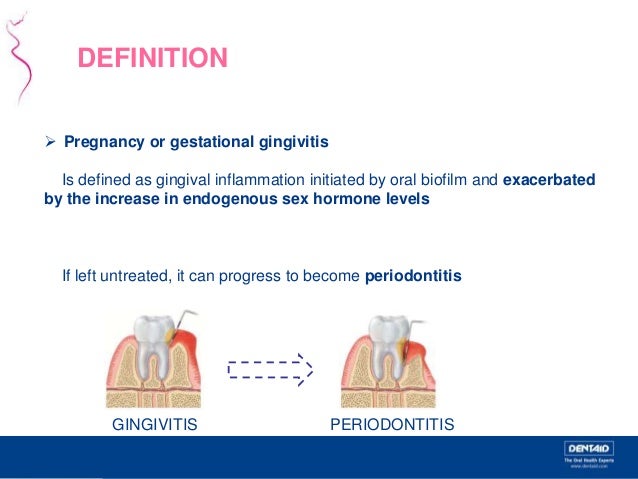
Image source: https://image.slidesharecdn.com/periodontaldiseaseandpregnancy-141029043846-conversion-gate01/95/periodontal-disease-and-pregnancy-4-638.jpg?cb=1414558652
Puberty and Adolescence
Males and females alike experience a surge of hormones during puberty and adolescence. For girls, there is a significant increase in estrogen and progesterone. This increases blood flow to the gums, making them more likely to bleed. Boys also have hormonal changes occurring. However, gingivitis in pubescent males is often attributed to a lack of oral hygiene.
To combat gingivitis during puberty, an increase in oral hygiene can be extremely helpful. More frequent dental cleanings will also remove plaque deposits and reduce the chance for inflammation.
Menstruation
Many women experience menstruation gingivitis, due to hormone fluctuations. This condition is characterized by symptoms that occur a day or two before the onset of the period, and diminish once the period has started. Symptoms associated with menstruation gingivitis may include red, swollen gums, canker sores, swollen salivary glands, and bleeding when flossing.
Birth Control Pills
Progesterone is a hormone included in many birth control pills. Because these oral contraceptives increase the levels of progesterone in the body, the gums are more susceptible to inflammation. If you are taking birth control pills, it is important to let your dentist know.
Pregnancy
During pregnancy, there is a rush of hormones that affect the body. Increased levels of progesterone can result in pregnancy gingivitis or gum disease at any point between the second and eighth month. Let your dentist know if you are pregnant. If you begin to notice swollen, tender, or bleeding gums, more frequent dental cleanings can prevent the problem from worsening.
Menopause
When a woman enters menopause, there are several changes that can occur regarding oral health. There is usually a decrease in estrogen production, which increases the risk for bone loss. If the density in the jawbone is compromised, it can lead to mobility or tooth loss later on. This may be characterized by gum recession, which leaves the teeth roots exposed and vulnerable to decay.
As women age, they also take more medications. Certain prescription drugs can cause dry mouth, which can significantly increase the risk for tooth decay and gum disease. If you have noticed a decrease I salivary flow, mention it to your doctor. Oftentimes, medications or dosages can be altered. There are also various products on the market that can stimulate your salivary glands and encourage saliva production.
Tips for Maintaining Optimal Gum Health
If you are experiencing gingivitis, dry mouth, or other oral health issues due to hormone fluctuations, there are a few things you can do. It is important to:
Maintain routine dental visits. Regular checkups and cleanings can help your dentist monitor your progress and identify potential problems early.
Eat a balanced diet, rich in fresh fruits and vegetables.
Brush at least two times per day with a fluoride toothpaste.
Floss at least once per day.
Use an antibacterial mouthwash at least once per day.
Avoid starchy foods and sugary drinks.
Learn More about Hormones and Oral Health
Hormones can wreak havoc on your oral health, but there are many ways to treat the issue. If you would like more information, please visit Metropolitan Dental Cares website.
